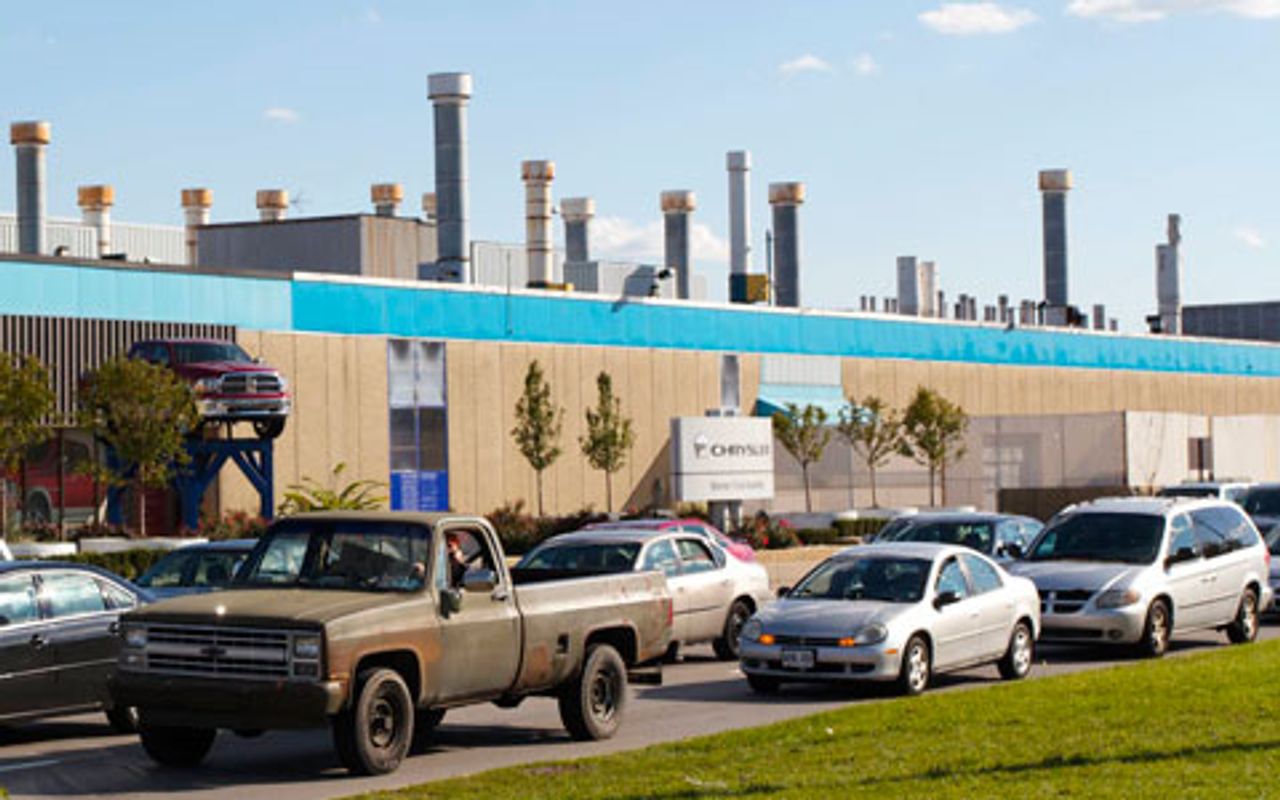Two weeks after the United Auto Workers signed a new round of labor agreements with General Motors, Ford and Chrysler, it is becoming clear that the deals only set the stage for a further offensive against auto workers in the US and internationally.
 Chrysler workers at shift change
Chrysler workers at shift changeOn Wednesday, GM announced it made $1.7 billion in third-quarter profits, following similar reports from Ford and Chrysler last month. Nevertheless, GM CEO Dan Akerman pledged to drive up profits in the US, Europe and other regions in order to boost the company’s share value and satisfy big investors. “We plan actions everywhere to improve our margins,” the company’s financial director stated.
There is immense anger among auto worker over the contracts, which were negotiated and then pushed through by the United Auto Workers in the face of widespread opposition. “Workers are very frustrated,” said Christina, a worker at Chrysler Warren Truck Assembly Plant in suburban Detroit. “After giving up so much we hoped to have gotten something back in our pockets. But the UAW got us nothing. They are all bought and paid for. The UAW is a corporation not a union.”
All three companies plan to take full advantage of the UAW contracts, which held labor cost increases to the lowest level in four decades. While freezing pay for long-term workers, the companies will be able to add some 20,000 new “second tier” workers earning $15 an hour—around half the traditional wage—and substandard health and retirement benefits.
Two days after the new contract was signed, Chrysler and Fiat CEO Sergio Marchionne declared that he wanted to replace the two-tier wage system with a single, lower wage for all workers. During negotiations with the UAW, Marchionne reportedly pressed for a $22-an-hour across-the-board wage by 2020. While providing a slight increase for the lowest paid workers, this would mean a 25 percent pay cut for the majority of the workforce.
While the UAW balked on this proposal—well aware that it would cause a rebellion by workers—Marchionne made it clear he would press ahead with such plans in the 2015 negotiations or even before.
 The Warren Truck plant in suburban Detroit
The Warren Truck plant in suburban DetroitHaving succeeded in sharply expanding the number of lower paid workers, the Chrysler-Fiat boss continues to threaten to close all his factories in Italy, where workers reportedly earn €27.69 ($38.55) an hour. The Italian authorities are seeking to use the European debt crisis to destroy longstanding protections and impose American-style wage cuts and “labor flexibility” on Italian workers.
In an editorial in the New York Times last week, Steven Rattner, the investment banker appointed by the Obama administration to head the restructuring of the auto industry in 2009, threw his support to the “exceptional chairman of both Fiat and Chrysler,” saying he backed Marchionne’s demands that Italian workers improve their “efficiency” or see their jobs shipped to Poland or the US.
In another fallout from the 2009 restructuring, the Wall Street Journal reported the UAW-run retiree health care trust fund—the Voluntary Employees’ Beneficiary Association or VEBA—could soon slash medical benefits and impose higher out-of-pocket costs on 820,000 retirees and their spouses. In 2007, the UAW allowed the automakers to dump their retiree health care obligations into the union-run fund. Two years later, the UAW accepted White House demands that much of their payments be made in corporate shares instead of cash. The trust fund is now running out of money due to higher-than-expected rises in health care costs and the falling value of the automakers’ shares.
“At that time, everybody understood the VEBA would probably not cover all of retirees’ health care benefits and that the UAW or trustees of the VEBA would have to made decisions about cutbacks,” Rattner told the Journal. “It was going to be their problem, not the companies’ problem.”
Opposition to the UAW-backed contract is particularly widespread at Chrysler, where the deal was only passed through a combination of intimidation, vote tallies that were widely considered fraudulent by workers, and a decision to simply ignore the “no” vote by skilled workers.
“We need a revolution to get rid of the UAW and build a whole new organization,” Christina, the auto worker at Warren Truck, told the WSWS. “We are discussing in the plant what this would consist of. But right now it’s only wishful thinking. We know it would take a revolution to overthrow the UAW.
“The US is run by corporate greed; that’s capitalism. Workers have no rights. The UAW constitution says we have basic rights, but they ignore it. This was the best contract they could come up with, they said, but it’s nothing but more two-tiers and wage freezes.”
Ricky, a worker with 17 years, said, “This is worldwide. Our brothers and sisters in Italy are being told their plants are going to close. But we’re not going to take food out of their mouths. They do the same thing to us here, threatening to close plants in the US and ship them out. I think we need to unify workers everywhere.”
Karen, a Chrysler worker with 14 years, added, “Cheap labor is going to be the new world order. I’m upset with Obama—I voted for him and believed he would change things. But he kept people from Bush’s cabinet and then he bailed out Wall Street and took six minutes out of my break time at Chrysler.
“They just want to keep taking and taking away while the executives get bonuses and profits. It doesn’t matter whether the Republicans or the Democrats are in there. They are all together.”
Referring to the contract vote, Karen added, “The election was fixed at Warren Truck. You can’t trust the union. Normally when we have a big turnout it’s because people are disgruntled and want their voices to be heard. Nine out of 10 times they want to vote against something. This time, the UAW said 70 percent of the workers voted for the contract. Nobody believes it.
“The UAW is part owner of the company, and I’m supposed to think they are going to negotiate the best deal on my behalf? They try to get workers thinking just about themselves and to forget about the next generation working for two-tier wages. The union reps say, ‘you ought to be happy you have a job’ and say the plant will close if you resist.
“The UAW is supposed to support us—but they don’t. They have a big resort at Black Lake, and there’s lots of waste and over-the-top things. Now they are using the VEBA as an investment fund to make money.
“Workers feel it is time for a new organization. What else can we lose? They’ve cut our break time by six minutes. We’re already at the bottom. Inside the factory we share pain pills all day long. It’s like ‘Who’s got the Aleve?’ ‘Where’s the Tylenol?’ The aging workers, especially, are moaning and groaning just trying to make a dollar.”
Every section of the working class is facing the same conditions, she said. “My mom used to work at the Chevy Gear & Axle plant and retired before it was sold off to American Axle. Now they are threatening to go after her benefits.
“It’s not only a recession, it’s a depression. My friend’s husband works at a rental storage place in Sterling Heights. He went to get property out of one of the units that was abandoned, and when he opened the door there was a whole family living inside, two kids and their parents. He was amazed and shocked. How do you evict a family from a storage unit? This is how bad conditions are getting. There is going to have to be a change.”
Commenting on the protests against Wall Street, Karen said, “They are wonderful and beautiful—I support them all the way. But the union passed out a leaflet in the factory saying they supported the Occupy Detroit protests. I said to myself, ‘Wait a minute, how can they help? They’re the problem.’”
